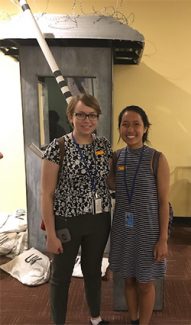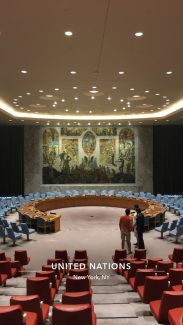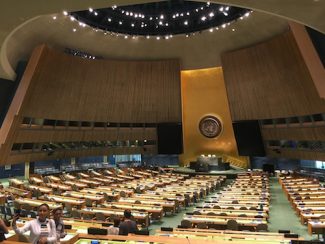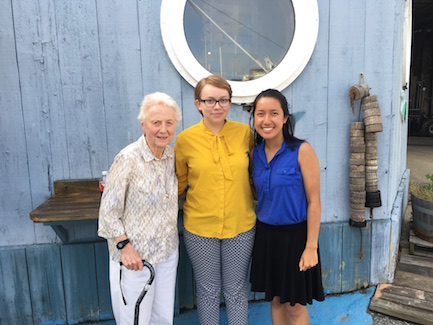While some may be sleeping in, lounging by the pool or flipping through the pages of a favorite novel, students Annie Dang and Linnea Ristow started an internship together with the Partnership for Global Justice. The two recently returned from a week-long trip to New York City, N.Y., where they attended sessions hosted by the United Nations (U.N.).
According to its website, the Partnership for Global Justice (PGJ) is an “International Non-governmental Coalition of congregations, groups, and individuals grounded in gospel values who work in partnership by providing workshops and advocacy training to raise consciousness and awareness for the promotion of the United Nations Charter.”

Its base is located in New York, where Sr. JoAnn Mark, ASC, Ed.D., currently resides. In 2015, Mark became the executive director of the PGJ after working with Newman University for 22 years. Professor of History and Director of International Studies Cheryl Golden, Ph.D., is a Wichita board member for the PGJ, and was the one to reach out to both Dang and Ristow about the internship.
“Linnea and Annie are both very interested in the challenges that the world faces today,” Golden said. “They are both involved with International Studies, so each will develop a project when they return to campus inspired by their time at the U.N. with PGJ. We are very excited to see what they will do.”
Dang is a biology major with a minor in international studies, and Ristow is an international studies major with minors in biology, math and history. Ristow hopes to someday work for a non-profit organization and said that the PGJ more directly related to what she would be doing in the future.
“The other internship possibilities I had were with museums or the International Rescue Committee,” Ristow said. “I feel like the sustainable development goals of the PGJ really aligned with what I’ll be seeing in developing countries as a missionary.”
Dang’s interest in the U.N. began with her honors class led by Associate Professor of History and Chair of the Humanities Division Kelly McFall, Ph.D., where students participated in role playing games that focused on specific countries, figures and events in history. One of McFall’s games centered around the Rwandan Genocide and students were given a better understanding of the structure of the U.N., specifically with the security council.

While the students were in New York, they primarily attended sessions in order to peak their interest in one of the 17 sustainable development goals coined by the U.N. In addition to completing some office work for Mark, the bulk of Dang and Ristow’s work will be done now as the two plan and design a project around one of these sustainable development goals. One of the most challenging parts is deciding how to come up with the basis for the project, Ristow said.
“There are a lot of things that we are passionate about,” Ristow said. “We’ll inevitably end up doing more research, but first we need to narrow it down to something that we know enough about as a springboard to start the project. And then I think we both struggled with understanding how we are going to actually make an impact beyond just spreading awareness.”
Traveling to New York also presented opportunities for sightseeing. The duo visited Little Italy in Chinatown, the American Natural History Museum, the Museum of Modern Art, Times Square and Central Park. They even stopped to try new flavors of ice cream, which included ube, taro root, matcha and black sesame. Ristow topped her dish off with some Fruity Pebbles cereal and Lucky Charms marshmallows.
Takeaways

“I think it’s also interesting how intertwined the sustainable development goals are,” Ristow said. “Each one tends to have a greater ripple effect. Goal number five is one I am particularly interested in, which is Gender Equality and Women’s Empowerment. And that extends to so many other areas. We went to sessions that didn’t even seem remotely related to gender equality, but they would bring it up, like, ‘It’s essential when we’re fighting diseases that we utilize women,’ or ‘It’s essential that in upcoming elections in this country we have 30% women represented.’ And so it’s interesting how they all play a role in just about everything.”
Dang said the PGJ helped her see how the U.N. is passionate about different subjects and focuses on issues such as decreasing poverty and hunger. However, it also extends beyond these by spreading awareness of climate change and informing others how to best use sustainable resources.
“It seemed like every country was working toward that, even though they did have their own interests as well,” Dang said. “Now I’m thinking I might want to work under the U.N. somehow, to have a job that really promotes those goals and helps the U.N. bring them to other countries. As a biology major, I can do research and potentially help developing countries to reach these goals and be more sustainable in their day to day life. Now I’m thinking about different projects or research opportunities I can do in the future, so in a way, it has jump-started my ideas and has made me think beyond Wichita.”

Ristow said, “It was also interesting to see the scope of the U.N. and how much it can accomplish outside of what one generally thinks of as their mission.”
A few of the sessions that Dang and Ristow went to discussed improving the living standards of other countries for those who are disabled in some way. Ristow said that blind, deaf and other individuals were invited as representatives to share how they would like to make the U.N. more accessible and provide more opportunities to those with disabilities. In addition, the two students attended a session that focused on ending financial abuse of older people by preventing scams and more.
“You don’t think about the U.N. doing that, you think of them [working with] big things like the Rwandan Genocide, Syria, and other big conflicts and wars,” Dang said. “But they do much more than that and I think they are more effective with the smaller tasks as well.”
Tips on travels
“Talk to us, we got lost a lot,” Dang said, laughing.
“The top two tips we can offer,” Ristow said, “are to be flexible and research before going into sessions. And then for traveling to New York, make sure you know the difference between uptown and downtown.”

Ristow said one memorable moment from their trip was the day it started raining when the forecast said otherwise. “We were in Chinatown and ran from awning to awning and tried our best to dodge the rain,” she said.
Dang added, “Always make sure you are on the right route. Don’t be confident, because there are times when you are like, ‘Okay, yes, I am on the subway, this is good.’ Because one time we got on a subway and we thought it was all good, but they had construction so they changed the stops. So we ended up going all the way back to Long Island, and all of a sudden we were going across a bridge, above the water, and were asking ourselves, ‘What is going on?’
“Everything that could have gone wrong went wrong, but at least we didn’t get mugged,” Dang said.
Ristow laughed, saying, “We always knew where we were going in the end, but on any trip to New York, be sure to ask strangers for help and double check signs.”


